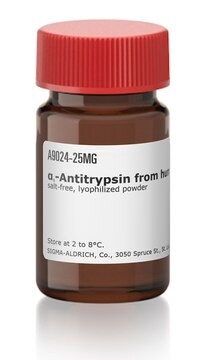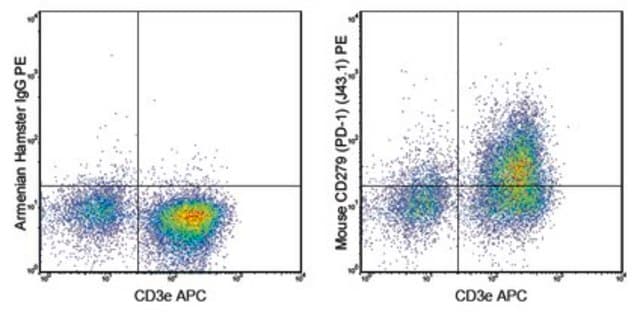SAB4200198
Anti-Alpha-1-Antitrypsin (AAT) antibody,Mouse monoclonal
clone 1C2, purified from hybridoma cell culture
Sinônimo(s):
Anti-A1A, Anti-A1AT, Anti-AAT, Anti-Alpha-1 protease inhibitor, Anti-Alpha-1-antiproteinase, Anti-Alpha-1-antitrypsin, Anti-PI1, Anti-Protease inhibitor 1 (anti-elastase), Anti-SERPINA1, Anti-Serpin peptidase inhibitor, clade A, member 1
About This Item
Produtos recomendados
fonte biológica
mouse
conjugado
unconjugated
forma do anticorpo
purified from hybridoma cell culture
tipo de produto de anticorpo
primary antibodies
clone
1C2, monoclonal
forma
buffered aqueous solution
peso molecular
antigen ~45 kDa
reatividade de espécies
human
concentração
~1.0 mg/mL
técnica(s)
western blot: 1-2 μg/mL using whole extracts of human HepG2 cells
Isotipo
IgG2b
nº de adesão UniProt
Condições de expedição
dry ice
temperatura de armazenamento
−20°C
modificação pós-traducional do alvo
unmodified
Informações sobre genes
human ... SERPINA1(5265)
Descrição geral
Imunogênio
Aplicação
Ações bioquímicas/fisiológicas
forma física
Exoneração de responsabilidade
Not finding the right product?
Try our Ferramenta de seleção de produtos.
Código de classe de armazenamento
10 - Combustible liquids
Ponto de fulgor (°F)
Not applicable
Ponto de fulgor (°C)
Not applicable
Certificados de análise (COA)
Busque Certificados de análise (COA) digitando o Número do Lote do produto. Os números de lote e remessa podem ser encontrados no rótulo de um produto após a palavra “Lot” ou “Batch”.
Já possui este produto?
Encontre a documentação dos produtos que você adquiriu recentemente na biblioteca de documentos.
Nossa equipe de cientistas tem experiência em todas as áreas de pesquisa, incluindo Life Sciences, ciência de materiais, síntese química, cromatografia, química analítica e muitas outras.
Entre em contato com a assistência técnica







